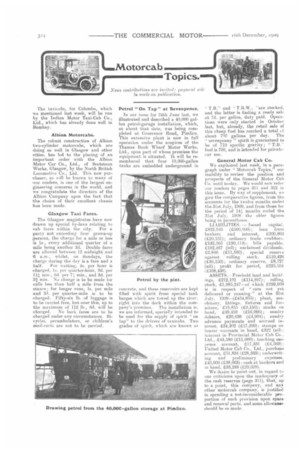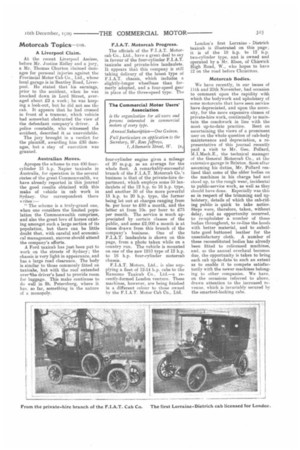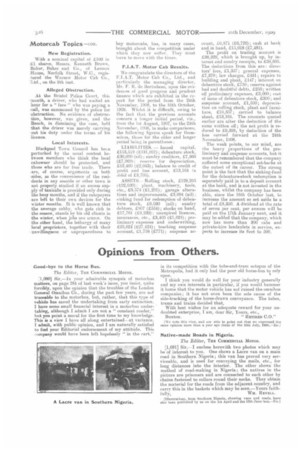Motorcab Topics,
Page 16

Page 17

Page 18

If you've noticed an error in this article please click here to report it so we can fix it.
News contributions are invited: payment will be made on publication.
The taxicabs, for Colombo, which 'we mentioned last week, will be run by the Indian Motor Taxi-Cab Co., Ltd., which has already done well in Fiembay.
Albion Motorcabs.
The robust construction of Albion two-cylinder motorcabs, which are doing so well in Glasgow and other cities, has led to the placing of an important order with the Albion Motor Car Co., Ltd., of Seetstoun Works, Glasgow, by the North British Locomotive Co., Ltd. This new purthaser, as sill be known to many of our readers, is one of the largest engineering concerns in the world, and we congratulate the directors of the Albion Company upon the fact that the choice of their excellent chassis has been made.
Glasgow Taxi Fares.
The Glasgow magistrates have now +drawn up special by-laws relating to cab fares within the city. For a party not exceeding four grown-up ;persons, the charge for a mile or less is is., every additional quarter of a mile being another 3d. Double fares are allowed between 12 midnight and 6 a.m., whilst, on Sundays, the charge during the day is a fare and a
half. For waiting, 48. per hour is charged, Is. per quarter-hour, 9d. per 1.14 min., 6d. per 7 min., and 3d. per 3,1 min. No charge is to be made for calls less than half a mile front the stance; for longer runs, Is. per mile and 3d. per quartet-mile is to he charged. Fifty-six lb. of luggage is to be carried free, but over this, up to the maximum of 112 lb., 6d. will be charged. No back fares are to be charged under any circumstances, Bicycles, perambulators, or children's mail-carts are not to be carried.
Petrol "On Tap" at Sevenpence.
In our issue for 24th June last, we illustrated and described a 40,000 gallon petrol-garage installation, which, at about that date, was being completed at Grosvenor Road, Pimlico. This extensive plant is now in full operation under the auspices of the Thames Bank Wharf Motor Works, Ltd., upon part of whose premises the equipment is situated. It will be remembered that four 10,000-gallon tanks are embedded underground in
concrete, and these reservoirs are kept filled with spirit from special tank bargee which are towed up the river, right into the dock within the com pany's premises. The installation is, we are informed, specially intended to be used for the supply of spirit " on tap" to the drivers of taxicabs. Two grades of spirit, which are known as " T.B." and " T.B.W., "are stocked, and the latter is finding a ready sale at 7d. per gallon, duty paid. Operations were only started in October last, but, already, the retail sale of this cheap fuel has reached a total (.:1 about 700 gallons per day. The
sevenpenny " spirit is guaranteed to he of 710 specific gravity ; " T.D.' fuel is 700, and is intended for privatecar use.
General Motor Cab Co.
We explained last week, in a paragraph under " Motorcab Topics," our inability to review the position and prospects of the General Motor Cab Co. until to-day. We would now refer our readers to pages 311 and 312 in this issue. By way of supplement, a e give the comparative figures, from the accounts for the twelve months ended the 31st July, 1909, and from those for the period of 14?j months ended the 31st July, 1908 the older figures being in parentheses.
LIABILITIES. — Issued capital £822,946 (£500,000); loan from bankers and interest, £200,863 (£20,101); ordinary trade creditors. £132,505 (190,113); hills payable, £192,467 (nil); unclaimed dividends, 02,846 (L11,590); special reserve against rolling stock, £110,426 (£36,150); ordinary reserve, £8,727 (nil); profit for period, £225.554 (C168,438).
ASSETS.—Freehold land and buildings, £212,191 (£114,897); rolling stock, £1,085,247—of which £299,059 is in respect of " cars not yet delivered or running " at the 31st July, 1909—(454,855); plant, machinery, fittings, fixtures and furniture, £15,855 (£9,150); stocks on hand, £49,459 (£16,096); sundry debtors, £.20,638 (£4,901); sundry advance payments and accrued interest, £34,302 (£17,399); stamps on hearer warrants in hand, I:322 (nil); interest in Provincial Motor Cab Co., f,td., £43,580 (L11,000); teaching suspense account, L11,331 (£4,569); United Motor Cab Co., Ltd., purchase account, £51,834 (028,333); underwriting and preliminary expenses, £40,000 (38,063); cash at bankers and in hand, £33,288 (L29,029).
We desire to point out, in regard to our criticisms upon the inadequacy of the cash reserves (page 311), that, up to a point, this company, and any other motorcab company, is justified in spending a not-inconsiderable proportion of such provision upon sparw and renewal parts. and some allowance should be so made. A Liverpool Claim.
At the recent Liverpool Assizes, before Mr. Justice Ridley and a jury, a Mr. Thomas Churton claimed damages for personal injuries against the Provincial Motor Cab Co., Ltd., whose local garage is in'Bentley Road, Liverpool. He stated that his earnings, prior to the accident, when he was knocked down in Lord Street, averaged about £2 a week ; he was keeping a look-out, but he did not see the cab. It appears that he had crossed in front of a tramcar, which vehicle had somewhat obstructed the view of the defendant company's driver. A police constable, who witnessed the accident, described it as unavoidable.
The jury brought in a verdict for the plaintiff, awarding him £35 damages, but a stay of execution was granted.
Australian Moves.
Apropos the scheme to run 400 fourcylinder 15 h.p. Napier taxicabs in Australia, for operation in the several states of the great Commonwealth, we have already reported in this journal the good results obtained with this make of vehicle in cab work in Sydney. Our correspondent there writes :— "The scheme is a truly-grand one, when one considers the limited population the Commonwealth comprises, and also the great love of horses existing amongst such a large section of its population, but there can be little doubt that, with careful and economical management, success should attend the company's efforts.
A Ford taxicab has just been put to work on the streets of Sydney ; the chassis is very light in appearance, and has a large road clearance. The body is similar to those commonly fitted on taxicabs, but with the roof extended overethe driver's head to provide room for luggage. This make continues to do well in St. Petersburg, where it has, so far, something in the nature of a monopoly. F.I.A.T. Motorcab Progress.
The officials of the FIAT. Motorcab Co., Ltd., have a great deal to say in favour of the four-cylinder FLAT. taxicabs and private-hire landaulets. It appears that this company is still taking delivery of the latest type of FIAT. chassis, which includes slightly-longer wheelbase than formerly adopted, and a four-speed gear in place of the three-speed type: The four-cylinder engine gives a mileage of 20 m.p.g. as an average for the whole fleet. A remarkably-successful branch of the F.I.A.T. Motorcab Co.'s business is that of the private-hire department, which employs some 50 Iandaulets of the 12 h.p. to 16 h.p. type, and another 50 of the more powerful 15 h.p. to 20 h.p. type, the former being let out at charges ranging from Bs. per hour to £60 a month, and the latter at from 10s. per hour to £75 per month. The service is much appreciated by certain classes of the public, and some £2,000 a month is at times drawn from this branch of the company's business. One of the F.I.A.T. landauIets is shown on this page, from a photo taken while on a country run. The vehicle is mounted on one of the new 1910 type of 12 h.p. to 16 h.p. four-cylinder motorcab chassis.
FLAT. Motors, Ltd.. is also supplying a fleet of 12-14 h.p. cabs to the Ransome Taxicab Co.. Ltd.—a recently-formed London venture. These machines, however, are being finished in a different colour to those owned by the FIAT. Motor Cab Co., Ltd. London's first Lorraine Dietrich taxicab is illustrated on this page; it is of the 10 h.p. to 12 h.p, two-cylinder type, and is owned and operated by a Mr. Elsee, of Chiswick High Road, W., who hopes to have 12 on the road before Christmas.
Motorcab Bodies.
We have recently, in our issues of 11th and 25th November, had occasion to comment upon the rapidity with which the bodywork and upholstery of some motorcabs that have seen service have depreciated, and upon the necessity, for the more expensive classes of private-hire work, continually to maintain the coachwork in line with the most up-to-date practice. Bent on ascertaining the views of a prominent user on the whole question of cab-body maintenance and depreciation, a representative of this journal recently paid a visit to Mr. Geo. Pollard, M.I.Mech.E., the technical manager of the General Motorcab Co., at the extensive garage in Brixton. Soon after assuming his duties, Mr. Pollard realized that some of the older bodies an the machines in his charge had not stood up. to the rough wear, incidental to public-service work, as well as they should have done. Especially was this so in respect of the trimming and upholstery, details of which the cab-riding public is quick to take notice. Steps were, therefore, taken, without delay, and as opportunity occurred, to re-upholster a number of these bodies throughout, to re-line the hoods with better material, and to substitute good buttoned leather for the unsatisfactory cloth. A number of these reconstituted bodies has already been fitted to relicensed machines, and, as the annual overhaul becomes due, the opportunity is taken to bring each cab up-to-date to such an extent as to enable it to compete satisfactorily with the newer machines belonging to other companies. We have. on the occasions referred to above. drawn attention to the increased revenue, which is invariably secured by the smartest-looking cabs.
New Registration. .
With a nominal capital of £100 in £1 shams, Messrs. Kenneth Brown, Baker, Baker and Co., of Lennox House, Norfolk Street, W.C., registered the Warsaw Motor Cab Co., an the 9th inst.
Alleged Obstruction,
At the Bristol Police Court, this -month, a driver, who had waited an hour for a " fare" who was paying a -ball, was summoned by the police for .obstruction. No evidence of obstruction, however, was given, and the Bench, in dismissing the ease, held that the driver was merely carrying out his duty under the terms of his licence.
Local Interests.
Blackpool Town Council has been perturbed by the usual contest between members who think the local cabowner should be protected, and those who are for free trade. There .11re, of course, arguments on both .aides, as the convenience of the residents in any seaside or other town is not properly studied if an excess supply of taxicabs is provided only during the busy months, and if the ratepayers are left to their owu devices for the winter months. It is well known that the average cabby, who gets rich in the season, stands by his old clients in the winter, when jobs are scarce. On the other hand, the lethargy of many local proprietors, together with their • unwillingness or unpreparedness to buy motorcabs, has, in ninny cases, brought about the competition under which they now suffer. They must learn to move with the times.
F.I.A.T. Motor Cab Results.
We congratulate the directors of the FLAT. Motor Cab Co., Ltd., and particularly the managing director, Mr. F. Ti. de Bertodano, upon the evidences of good progress and prudeat finance which are exhibited in the report, for the period from the 24th November, 1908, to the 16th October, 1909. Whilst it is difficult, owing to the fact that the previous accounts concern a longer initial period, viz., from the let August, 1907, to the 24th November, l908, to make comparisons, the following figures speak for themselves, those for the elder and longer period being in parentliesee LIATITLITIES. — Issued capital,
£153,519 (£131,666); debenture stock, £30,000 (nil); sundry creditors, £7,360 (L7,909); reserve for depreciation, £12,400 (£2,043); balance to credit of profit and loss account, £13,164 debit of £3,700).
ASSETS.— Rolling stock, £128,265 (02,039); plant, machinery, tools, etc., 0,574 (£1,201); garage alterations and improvements, £3,694 (nil) ; sinking fund for redemption of debenture stock, £6,030 (nil); sundry debtors, £907 (£554); stocks on hand, £17,761 (0,239); unexpired licences, insurances, etc., £3,405 (£1,624); preliminary expenses and underwriting, £25,624 (£27,424); teaching suspense account, £1,758 (£771); suspense ac
count, L6,871 (.C6,726); cash at bank and in hand, £15,018 (£7,481).
The profit on trading account is £38,329, which is brought up, by interest and sundry receipts, to £38,605. The deductions from this are: directors' fees, £1,337; general expenses, £7,370; law charges, £431; repairs to building and plea, £147; interest on debenture stock, £750; reserve against bad and doubtful debts, £250; written off preliminary expenses, 0.000 ; cost of issue of debenture stock, £300; and suspense account, £1,500; depreciation on rolling stock, plant and furniture, £10,357; carried to balance sheet, £13,164. The amounts quoted earlier are after the deduction of the sums written off; the net profit is reduced to 0,398, by deduction of the lass carried forward at the 24th November, 1908.
The weak points, to our mind, are the heavy proportions of the preliminary and suspense accounts, but it must be remembered that the company suffered some exceptional set-backs at the outset of its career. The strong point is the fact that the sinking-fund for the debenture-stock redemption is separately paid in to a deposit account at the bank, and is not invested in the business, whilst the company has been able, since the 16th October last, to increase the amount so set aside to a total of £8,350. A dividend at the rate of seven per cent, per annum will be paid on the 17th January next, and it may be added that the company, which now has more than 300 cabs and private-hire landaulets in service, expects to increase its fleet to 500.
























